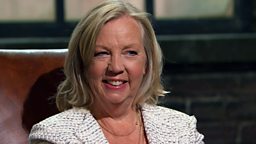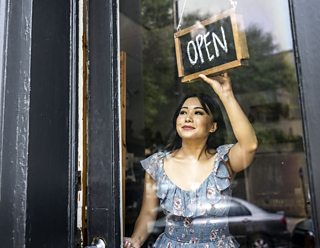Deborah Meaden: My seven tips for starting a new business
The number of people starting up their own businesses is slowly rising again, after a big drop during the 2020 Covid lockdowns.
In 2023 more than 100,000 more people were self-employed than in the previous year, bringing the total number of solo entrepreneurs to 4.2 million.
Those businesses vary hugely, from dog walkers to inventors. But the skills needed to launch a business alone can be very similar, as Deborah Meaden from Dragons' Den told 大象传媒 Radio 4's Money Box Live in a special episode dedicated to business start-ups.
Here's the advice Deborah shared with Money Box presenter Felicity Hannah...

1. Entrepreneur is a doing word
Many people can think up a great business idea but only the people who put time and energy into their idea can expect to see it take off.
Deborah says: “Lots of people can have great ideas but they have absolutely no way of delivering them. And when you come into Dragons' Den or when you're seeking any business investment, you've got to be able to show why you.
“That is the difference, that's what makes an entrepreneur,” Deborah continues. “A lot of people have great ideas but it stays on their sofa or it stays in their head… But entrepreneurs actually do something about it.
"Now what that something is can be very different for different entrepreneurs. It might just be that they go and speak to somebody about it and say: ‘This is my idea, I don’t know how to do it, can I partner with you?’ It might be that they've got the skills to do it themselves but they DO something.”

2. Side hustles can be safer
Many people begin their start-up as a side hustle, something they do alongside the day job. Sometimes that's simply to earn some extra money when times are tight – a study by IPSE, which is a membership organisation for the self-employed, suggests that 35% of side hustlers are doing it to boost their incomes.
However, some are doing it to test run a business idea without taking a huge risk. “I definitely see more side hustles going on now and I think that’s for different reasons,” says Deborah.
“I think people are very cautious at the moment and they have reason to be. It's a funny old world out there. So I think the days of saying ‘I'm gonna chuck everything in and I'm gonna give it a go’ does still happen but I think it happens less.”
3. Businesses grow up
So at what point should an entrepreneur decide to ditch the day job and throw everything behind their new business? When is it right to take that risk?
“I think it's when businesses start to begin to have a life of their own,” says Deborah. “So I describe businesses as like having children. When they're babies and toddlers you've got to wander around and make sure they're still standing, they're still walking, they're being fed.
"But there comes a moment where they get a life of their own, the engine just starts ticking over without you having to feed it all the time. And that's the moment you can start thinking to yourself maybe this is the time to jump.”
4. There are life stages when it's safer to take risks
Starting a business or turning self-employed can be difficult and one person emailed Money Box Live to say that they had earned so little they had turned back to employment.

There has been a significant increase in over-50s turning self-employed. In 2023 there were 1.1 million entrepreneurs in that age group.
Deborah says it's important to consider what risks you can take at each life stage. “It's very different for different people. If I'm a young start-up, I've got no dependents, I don't have a mortgage, my risk is still the same risk but the effect on me if it went wrong would probably be less than if I have children to support and a mortgage to support.”
Interestingly, there has also been a significant increase in over-50s turning self-employed. In 2023, the number of self-employed business owners aged 50 and over had increased by almost 90,000 compared to 2020, meaning there are 1.1 million entrepreneurs in that age group.
One Money Box listener Lisa contacted the programme to say she had started her sweet hamper business at 53, adding: “The normal employment roles don't respect my talents so it was time to do something on my own.”
Vicks Rodwell, Director of Membership for IPSE, tells the programme many older entrepreneurs are just really well placed to take risks. “We're seeing two different reasons for people going into it. One is getting a little bit sick of the workplace, it isn’t working with their lifestyle or perhaps they were made redundant. There’s definitely an element of ageism in recruitment that has seen a number of over-50 people start working for themselves, because they get fed the line that they’ve got too much experience. The plus side is that they can take that experience and do it for themselves.
“We are seeing other people where they’ve hit that point in their life where they're confident about who they are and what they can offer. They might be more financially secure, they have equity in their home, their children have grown up and they feel now is the time to be confident in who they are and what they're offering and take that leap into self-employment.
5. Start-ups must be agile
For Deborah Meaden, an entrepreneur in 2024 has to be ready to respond to an increasingly turbulent business landscape: “The fact is that the world is in a funny place and I think that’s actually forever now. I think that the days of coming up with five and 10-year business plans have long gone. Because our needs and our desires and the world stage is changing much faster.
“So my advice to people is you've got to keep your head up. I think when you get into business, sometimes you can get your head down and just carry on doing what you're doing.
"But you've got to sense the air, you've got to see the mood that your consumer is in. When we're talking about a cost of living crisis, you need to be offering good value. You need to be able to explain WHY you are good value."

6. Your business needs a strong identity
A successful start-up will have a brand identity that customers can come to know, meaning they can build trust, Deborah explains.
“I always say a business has got a personality. It's like a person. And your consumer knows that personality and you need to be having conversations that actually fit that personality so that they trust you and when you talk about new things or talk about doing things in a slightly different way, they'll get it.”
7. Get some advice
Finally, Felicity asked if would-be entrepreneurs pitch ideas at Deborah wherever she goes. “Yes they do. That’s what they know me for, I completely get it. And they pitch for two things, they pitch for cash but they also pitch for advice.”
For more of Deborah's advice, and tips from other experts, listen to the episode on 大象传媒 Sounds.
The information contained in this article was correct at the time of broadcast on 31 January, 2024.
More from 大象传媒 Sounds
-
![]()
The Big Green Money Show
Deborah Meaden talks to some of the world's biggest business names about climate change.
-
![]()
10 tips for starting a business from junior entrepreneurs
Felicity Hannah gets advice from three young 'kidpreneurs'.
-
![]()
Eight things to know about love and money
Tips on managing your finances as a couple, from dating to divorce.
-
![]()
How much money do you need to be happy?
Adam Shaw explores the ins and outs of money鈥檚 relationship to wellbeing.





